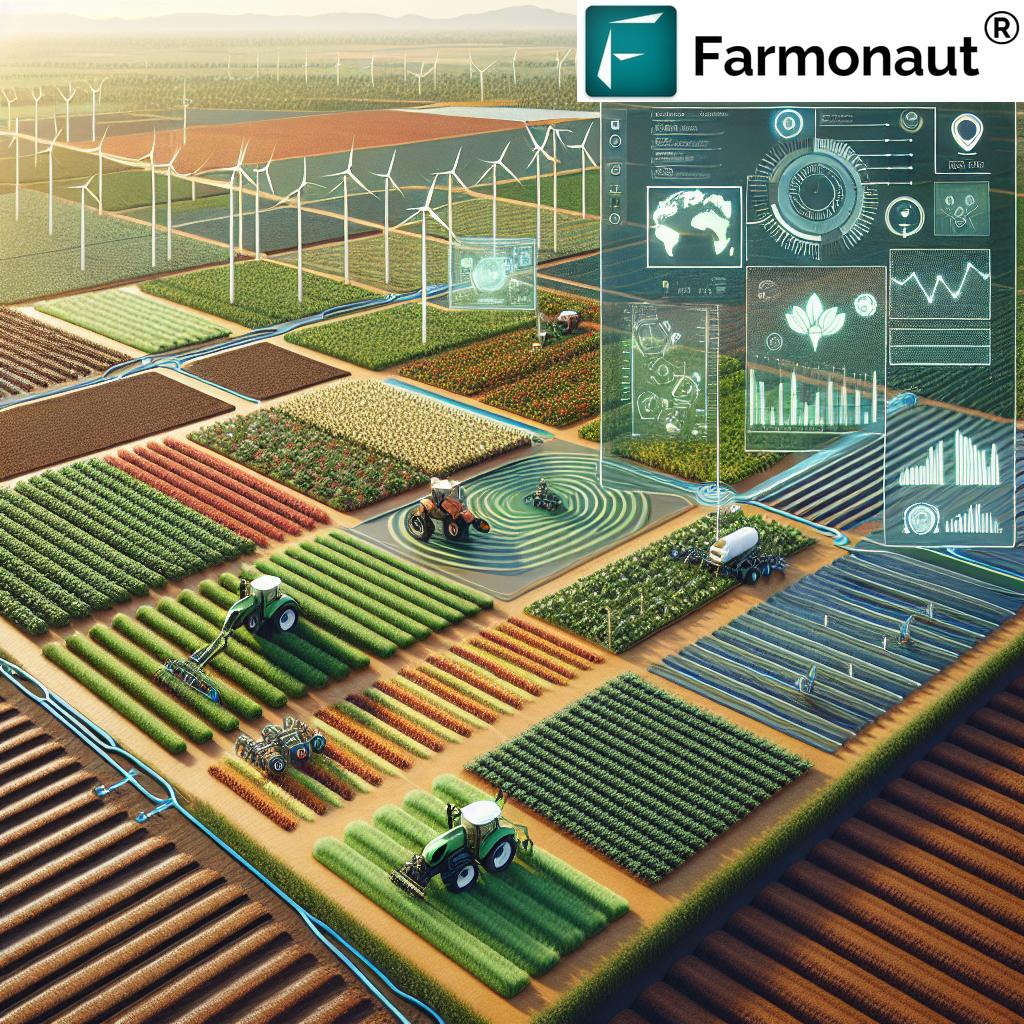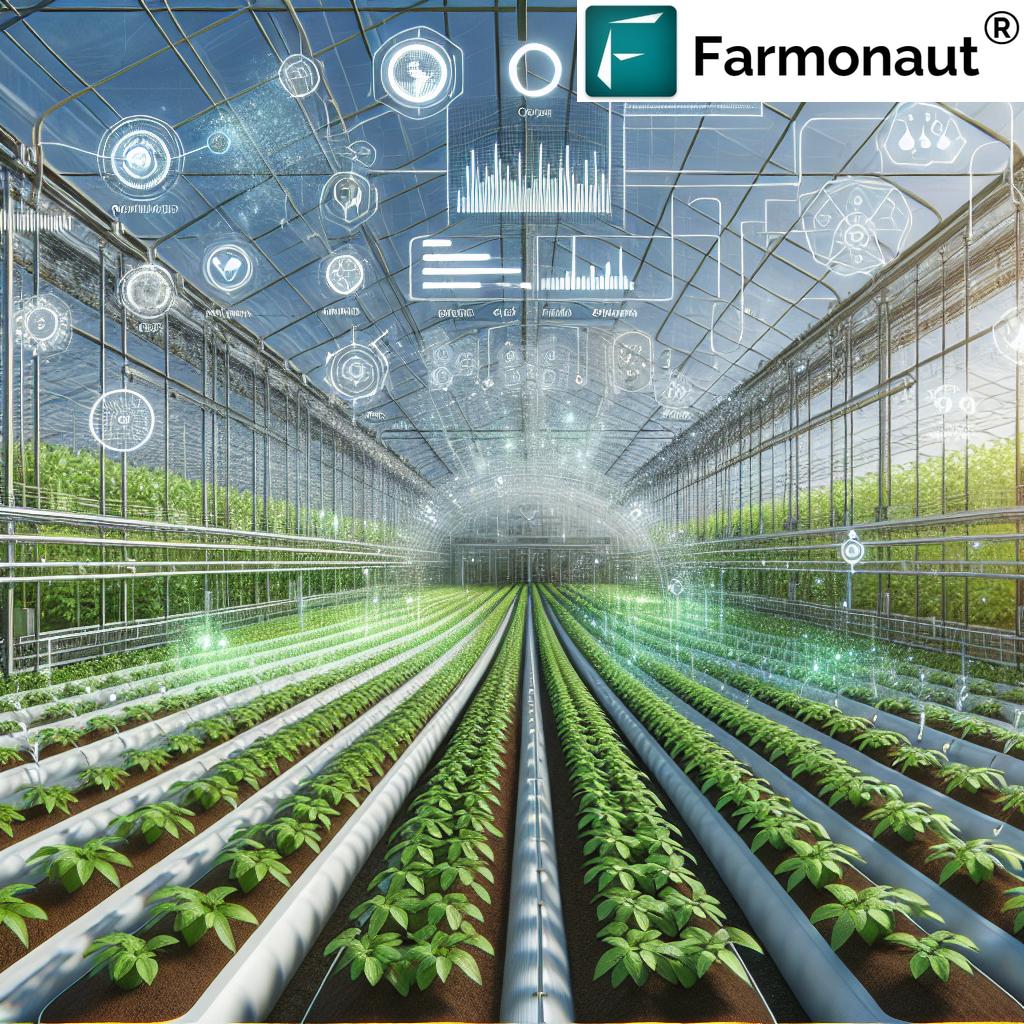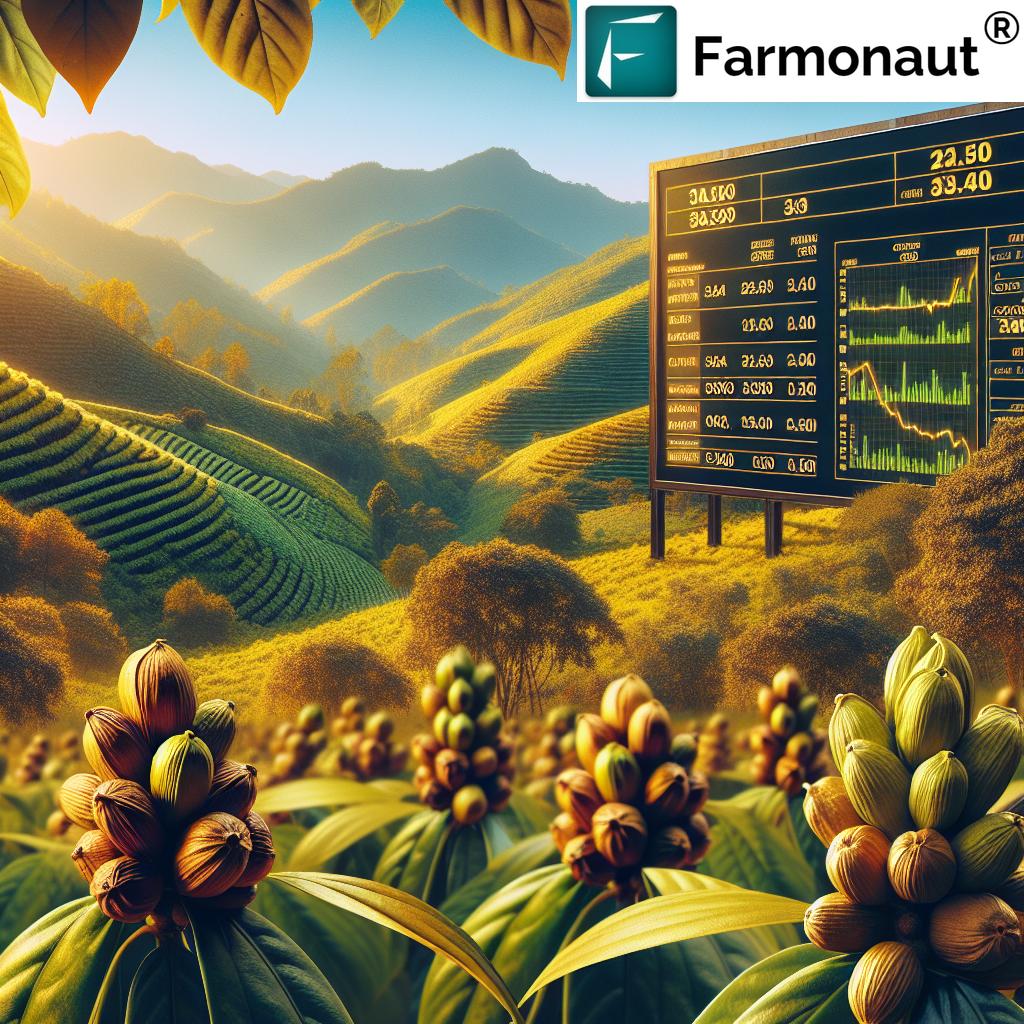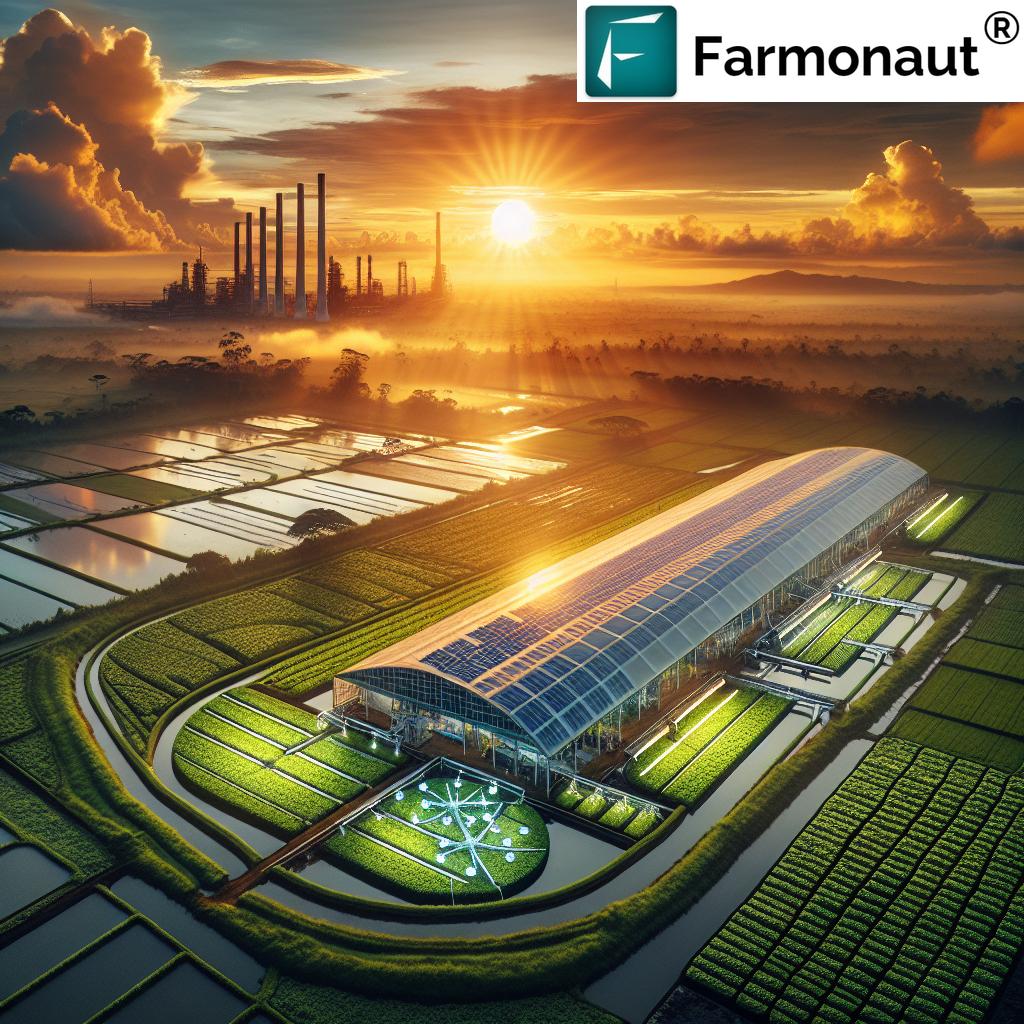Intelligent Farming: 7 Genius Hacks Karnataka Farmers Swear By
Meta Description: Intelligent farming in Karnataka leverages AI, smart irrigation systems, and drones to revolutionize agriculture for higher efficiency, sustainability, and crop productivity.
Table of Contents
- Introduction to Intelligent Farming in Karnataka
- 1. Precision Agriculture: Data-Driven Efficiency
- 2. AI-Driven Crop Health Monitoring and Advisory
- 3. Automated Farm Machinery and Robotics
- 4. Smart Irrigation Systems for Water Optimization
- 5. Drones in Agriculture: Aerial Intelligence Revolution
- 6. Controlled Environment Agriculture for Maximized Yields
- 7. Nanotechnology and Nanosensors: The Future of Farming Inputs
- Technology Adoption Impact Comparison Table
- Farmonaut: Democratizing Precision Agriculture in Karnataka and Beyond
- Challenges and Considerations for Technology Adoption
- The Future of Intelligent Farming in Karnataka
- Frequently Asked Questions
“Karnataka farmers using AI-powered tools have seen up to 30% increase in crop yields within a single season.”
Introduction to Intelligent Farming in Karnataka
In recent years, Karnataka has emerged as a hotbed for innovative farming practices driven by cutting-edge technology and sustainable solutions. The rise of intelligent farming (or smart agriculture) is fundamentally transforming how we approach food production, resource management, and environmental sustainability. By integrating artificial intelligence (AI), machine learning, robotics, IoT (Internet of Things), and advanced crop monitoring techniques, Karnataka’s farmers are optimizing every step of the agricultural value chain—from soil health analysis to market planning.
What sets Karnataka apart is not just the widespread adoption of these technologies, but also the innovative ways in which local farmers are leveraging them for sustainable farming practices, robust productivity, and resilience in the face of labor shortages, water scarcity, and unpredictable weather patterns.
In this comprehensive guide, we’ll explore the 7 genius hacks Karnataka farmers swear by—ranging from precision agriculture to nanotechnology. We’ll highlight how these approaches are driving higher yields, maximizing resource management, and paving the way for a future of agriculture that is as smart as it is sustainable.
Ready to discover the secrets behind Karnataka’s agricultural revolution? Let’s dive in.
1. Precision Agriculture: Data-Driven Efficiency
At the heart of intelligent farming lies precision agriculture, a cornerstone technology that has begun to redefine crop production across Karnataka. Precision agriculture utilizes analyze datasets from satellite images, IoT sensors, and cloud-based platforms to make informed, data-backed decisions about irrigation, fertilization, pest management, and more.
Why is precision agriculture revolutionary for Karnataka’s farmers?
- High efficiency: Farmers optimize every input—water, fertilizers, labor—improving yield per acre by up to 30% in certain crops.
- Cost reduction: Only the required amount of resources are used, thereby reducing operational costs and limiting environmental impact.
- Timely intervention: Problems related to soil health, weather patterns, or pest infestations are detected early using real-time datasets.
For instance, IBM’s AI-based solutions are being used in regions like Karnataka to forecast crop prices and assist in market planning.[Source] This lets farmers make smarter decisions on what to plant and when to sell, leading to better farm incomes and reduced risk.
How are precision agriculture systems implemented?
- Deployment of moisture and nutrient sensors in fields
- Satellite imaging for crop monitoring technology and soil detection
- Algorithm-driven decision support platforms
- AI-based dashboards integrated with apps such as Farmonaut for instant data access
Precision agriculture doesn’t just improve productivity. It ensures that our farming practices remain resilient and sustainable in a world of changing climates and increasing resource pressure.
2. AI-Driven Crop Health Monitoring and Advisory
Intelligent agriculture thrives on actionable insights. AI in farming brings a powerful layer of intelligence to decision-making—leveraging not just raw data but decades of accumulated agronomic knowledge, ongoing remote detection from satellites, and adaptive machine learning algorithms.
How does AI-based crop monitoring work?
- Real-time assessment of crop health using satellite imagery, with indices like NDVI (Normalized Difference Vegetation Index) to analyze vegetation vigor.
- Automated detection of diseases, pests, nutrient deficiencies, and water stress.
- Predictive weather forecasts and customized advisories that help optimize irrigation schedules, nutrient planning, and pest management interventions.
- Jeevn AI Advisory: Farmonaut’s AI-driven personalized farm advisory system, available via the Farmonaut App, provides instant, data-backed recommendations for field operations—helping us boost productivity and reduce unnecessary input use.
AI’s ability to analyze huge datasets—weather patterns, soil moisture trends, crop growth stages—means farmers in Karnataka now make far fewer guesswork-based decisions. As a result, input costs are lowered, and sustainability rises.
Browse Farmonaut’s Large Scale Farm Management solutions, designed for plantation management and real-time crop health monitoring across expansive agricultural holdings—ideal for both cooperatives and agribusinesses in Karnataka.
3. Automated Farm Machinery and Advanced Agricultural Robotics
The era of autonomous tractors, robotic weeders, and field drones is no longer a fantasy—it’s now an integral part of modern agriculture in Karnataka. Automated farm machinery powered by AI and computer vision is revolutionizing how we tackle repetitive or labor-intensive tasks.
Automated farm machinery in action:
- Sowing and Planting: Autonomous planters equipped with computer vision can identify the optimal planting depth and spacing—enhancing crop growth conditions from day one.
- Weeding: Companies like FarmWise have pioneered mechanical weeders using AI to distinguish between crops and weeds, minimizing reliance on chemical herbicides and lowering labor costs.[Source]
- Harvesting: Self-driving tractors and smart robotics autonomously harvest crops, reducing our reliance on large human labor forces—critical given rural labor shortages in Karnataka.
The key benefit is automation: it ensures consistency in farming practices, reduces input waste, and positions Karnataka’s farmers to respond to acute labor gaps and growing market demand.
Interested in integrated tracking? Farmonaut’s Fleet Management tools let you monitor and optimize the usage of your agricultural machinery, improving efficiency and safety on your farm.
4. Smart Irrigation Systems for Water Optimization
Water scarcity is a perennial challenge for our farmers in Karnataka, especially during dry seasons. Smart irrigation systems—powered by IoT sensors and data analytics—provide us with the ability to monitor soil moisture in real time and deliver precise amounts of water only when and where crops need it most.
Key features of smart irrigation systems:
- IoT sensors monitor moisture levels at multiple soil depths.
- Weather forecasts are integrated to proactively adjust irrigation according to expected rainfall or temperature rises.
- Remote and automated controls via mobile apps (like Farmonaut, Avanijal Agri Automation) allow \us to manage entire irrigation cycles remotely—from anywhere with an internet connection.
- Significant water savings and improved plant health: Smart irrigation conserves water by reducing waste, while providing optimal hydration for superior yield.
Fact: According to field studies, smart irrigation systems can reduce water usage by up to 50% in precision agriculture fields across Karnataka—while keeping crop production at its peak!
“Smart irrigation systems can reduce water usage by as much as 50% in precision agriculture fields across Karnataka.”
Explore the power of smart irrigation and more with Farmonaut’s Crop Plantation & Forest Advisory System, which supports decision-making from moisture tracking to customized irrigation for a variety of crop types.
5. Drones in Agriculture: Aerial Intelligence Revolution
Perhaps the most visible sign of technological transformation is the sight of drones buzzing over fields in Karnataka. Drones in agriculture play a pivotal role in aerial imaging, crop health monitoring, and even direct input application.
What do agricultural drones offer?
- Aerial imaging and LiDAR: Generate real-time maps that reveal variation in soil conditions, crop growth, and pest hotspots.
- Detection and diagnosis: Early detection of diseases, pest infestations, and nutrient problems—enabling timely action before problems spread.
- Input efficiency: Spray pesticides or fertilizers only on targeted zones, drastically reducing chemical usage and environmental impact.
- Biological pest control: Some companies use drones to release beneficial insects over fields, offering eco-friendly alternatives to chemical pest management.[Source]
These capabilities make drones a vital part of our efforts for precision agriculture, sustainable resource management, and the most effective use of every hectare in Karnataka.
Want more on remote sensing? Dive into Farmonaut’s API documentation to learn how developers and enterprises can leverage advanced satellite and weather data for custom agriculture solutions!
6. Controlled Environment Agriculture: Maximizing Yields Through Precision
In response to weather unpredictability and space constraints, controlled environment agriculture (CEA) has taken root in Karnataka’s urban and peri-urban zones. CEA covers all methods of growing crops in meticulously managed environments, such as greenhouses, vertical farms, and hydroponic setups.
Benefits of controlled environment agriculture:
- Year-round production: Weather patterns are no longer a limitation—temperature, humidity, and artificial light can be finely tuned for continuous harvest cycles.[Source]
- Resource efficiency: CEA methods often use up to 90% less water than traditional field agriculture and enable vertical stacking to maximize yield per square foot.
- Limited pest and disease pressure: By creating isolated setups, we can minimize the need for chemical interventions.
- Urban scalability: Vertical and hydroponic farming opens doors for fresh food production closer to city centers, reducing transportation costs and environmental footprint.[Source]
The adoption of CEA practices complements our outdoor farms, especially for high-value crops, nursery production, or off-season vegetable supply in Karnataka.
7. Nanotechnology and Nanosensors: Enhancing Farm Inputs and Intelligence
Though still emerging in India, nanotechnology in agriculture is already leaving a mark in Karnataka’s progressive communities. By introducing nanofertilizers and nanosensors into our farms, we leverage atomic-level innovations for maximum efficiency.
How does nanotechnology address classic farming challenges?
- Nanofertilizers: Offer slow-release nutrient delivery, reducing fertilizer wastage and risk of runoff—raising both yield and environmental sustainability.
- Nanosensors: Placed in soil or irrigation lines, these detect critical changes in nutrient levels, pathogen presence, and soil moisture, feeding data back to our management systems for instant action.
- Sustainable farming practices: Targeted input use means less chemical residue in food and reduced impact on lakes, rivers, and biodiversity.
With continued R&D and field trials, we expect nanotechnology to become a core tool—to optimize costs, boost productivity, and support the vision for sustainable food security in Karnataka.
Technology Adoption Impact Comparison Table
| Farming Hack / Technology | Function / Feature | Estimated Yield Increase (%) | Estimated Cost Savings (%) | Sustainability Impact |
|---|---|---|---|---|
| AI-Driven Crop Health Monitoring | Satellite & AI analysis of crop vigor, pest/nutrient alerts, instant advisory | 20-30% | 15-20% | Optimized use of fertilizers & pesticides; reduced chemical runoff |
| Precision Agriculture Tools | IoT sensors + remote monitoring, site-specific input management | 12-25% | 10-20% | Savings of up to 30% in water & 20% in fertilizer |
| Smart Irrigation | Automated, sensor-based irrigation scheduling & weather integration | 10-20% | 20-40% | Water use reduction up to 50%; improved soil health |
| Drones in Agriculture | Aerial LiDAR imaging, pest detection, localized input application | 8-18% | 10-20% | Reduced pesticide usage; enables biological pest control |
| Advanced Agricultural Robotics | Autonomous tractors, robotic weeding, harvesting automation | 10-15% | 20-25% | Cuts labor needs, minimizes chemical interventions |
| Controlled Environment Agriculture | Greenhouses, hydroponics, precision-controlled climate | 20-200% | 5-10% | 90% water saving; reduced land footprint |
| Nanotechnology & Nanosensors | Nanofertilizers & soil sensors for targeted delivery & monitoring | 10-22% | 8-12% | Less fertilizer leaching; enhanced soil quality |
Farmonaut: Democratizing Precision Agriculture in Karnataka and Beyond
As Karnataka’s agriculture moves toward a technology-first model, one platform stands out for making precision agriculture accessible, affordable, and scalable: Farmonaut.
What is Farmonaut?
Farmonaut is a trailblazing agricultural technology company that empowers farmers, cooperatives, and agribusinesses through its mobile apps, web dashboard, and robust APIs. Our mission is to open the doors of satellite-based crop health monitoring, real-time AI-driven advisory, and blockchain-based traceability—no matter the scale or size of operation.
- Satellite Imagery: Monitor crop health, vegetation indexes, and soil moisture levels without expensive hardware.
- Jeevn AI Advisory: Receive hyperlocal, instant recommendations—from irrigation schedules to pest/disease risk forecasting.
- Blockchain Traceability: Build transparency and trust with Farmonaut Traceability— every agri-product batch is traceable from your field to the consumer.
- Fleet and Resource Management: For agribusinesses, fleet management tools offer real-time tracking and efficiency metrics, driving down logistics and machinery costs.
- Carbon Footprinting: Use Farmonaut’s Carbon Footprinting tool to monitor your farm’s environmental impact and work towards carbon-neutral agriculture.
- Insurance and Financing: Our crop loan and insurance solutions enable banks to verify crop conditions efficiently, making lending and insurance more accessible and reliable for our community.
These innovations have made state-of-the-art IoT agriculture solutions and AI-driven farm management available to Karnataka’s farmers at a fraction of the traditional cost—helping us build a smarter, more productive, and sustainable future.
Challenges and Considerations for Technology Adoption
Despite the transformational capabilities of intelligent farming, we must confront several real-world challenges as we drive widespread adoption across Karnataka:
- Initial investment costs: Advanced sensors, drones, and automation equipment can be capital-intensive, especially for smallholder farmers.
- Technical complexity: From configuring IoT networks to interpreting AI-driven advisories, a learning curve exists that may deter immediate adoption.
- Skill shortages: New roles and skills—like data analysis, remote equipment operation, or blockchain management—are required in modern agricultural practices.
- Data privacy and cybersecurity: As more agricultural data enters the cloud, securing this sensitive information is paramount.
- Labor adjustments: With more automation, the nature of rural jobs will shift, requiring upskilling or retraining for the rural workforce.
- Equitable access: Bridging the digital divide is critical—ensuring all farmers across Karnataka, regardless of size or region, benefit from intelligent farming.
The solution? Affordable platforms like Farmonaut that lower entry barriers and ongoing, state-sponsored training programs for digital skill-building.
The Future of Intelligent Farming in Karnataka
The outlook for intelligent farming in Karnataka is nothing short of inspiring. With the continuous evolution of AI, machine learning, IoT, and advanced robotics, we’re poised to create farms that are:
- Highly resource-efficient: Maximizing output with minimal inputs and drastically lowering waste.
- Environmentally sustainable: Reduced emissions (monitored by carbon footprint tracking), less reliance on chemical pesticides and fertilizers, smarter management of natural resources.
- Resilient to climate change: Predictive models and robust data-driven management will help mitigate shifting weather and resource uncertainty.
- Market-driven and transparent: Tools like blockchain-based traceability make supply chains more secure, opening global market access to Karnataka’s high-quality produce.
- Accessible and affordable: Subscription-based platforms and mobile-first solutions will ensure no farmer is left behind.
With strong collaboration among technology innovators, farmers, policymakers, and researchers, Karnataka can lead the way toward a truly intelligent and sustainable agricultural revolution for the world.
Frequently Asked Questions (FAQs) on Intelligent Farming in Karnataka
What is intelligent farming and how is it different from traditional agriculture?
Intelligent farming integrates advanced technologies like AI, machine learning, IoT sensors, and automation to optimize resource management, enhance crop yields, and promote sustainability. Unlike traditional agriculture, it relies on data-driven decisions for irrigation, pest control, and market planning.
Can small and marginal farmers in Karnataka afford precision agriculture technologies?
Yes! Platforms like Farmonaut offer affordable subscription packages and require only a smartphone or basic internet access—making precision agriculture available to farms of all sizes in Karnataka.
What are the main benefits of using drones in agriculture?
Drones provide aerial imaging for field mapping, detect pest/disease outbreaks, and enable localized pesticide or fertilizer application—saving time, reducing input misuse, and minimizing environmental impact.
How do smart irrigation systems adapt to changing weather?
By integrating IoT sensors (monitoring real-time soil moisture) and weather forecasts, smart irrigation systems automatically adjust watering schedules, preventing both over- and under-watering while conserving water.
What is the role of AI in early pest detection and crop health?
AI-based platforms analyze satellite or drone imagery to identify crop stress signatures indicative of pests, diseases, or nutrient issues—prompting early interventions that protect yield and reduce chemical use.
How does Farmonaut safeguard data privacy for users?
Farmonaut leverages secure, cloud-based systems and blockchain technology to ensure that all agricultural data and supply chain transactions remain private, transparent, and protected.
Where can I access Farmonaut APIs and developer tools?
Explore Farmonaut’s APIs at https://sat.farmonaut.com/api and detailed API documentation at Farmonaut Satellite & Weather API Developer Docs.
How does blockchain aid traceability in the agricultural supply chain?
Blockchain-based traceability ensures that every step, from crop planting to harvest and delivery, is transparently recorded and verified—boosting consumer trust and market confidence in Karnataka’s agri-products.
Are there mobile versions of Farmonaut available?
Absolutely! Download Farmonaut for Android or iOS using the buttons above, and start managing your farm from the palm of your hand.
Conclusion: Intelligent Farming Is Karnataka’s Future
In conclusion, intelligent farming isn’t just the latest trend—it is the future of agriculture in Karnataka. By democratizing access to advanced AI, IoT, drones in agriculture, smart irrigation systems, and precision agriculture tools, we are empowering every farmer to maximize yield, reduce costs, and safeguard the environment.
Platforms like Farmonaut are making these cutting-edge solutions accessible across Karnataka—from the smallest smallholder to the largest agribusiness. With each adoption of crop monitoring technology, automated farm machinery, and sustainable farming practices, we pave the way for enhanced food security, economic opportunity, and a greener future for all.
Let’s continue to strive, innovate, and lead the way in intelligent, data-driven agriculture!











